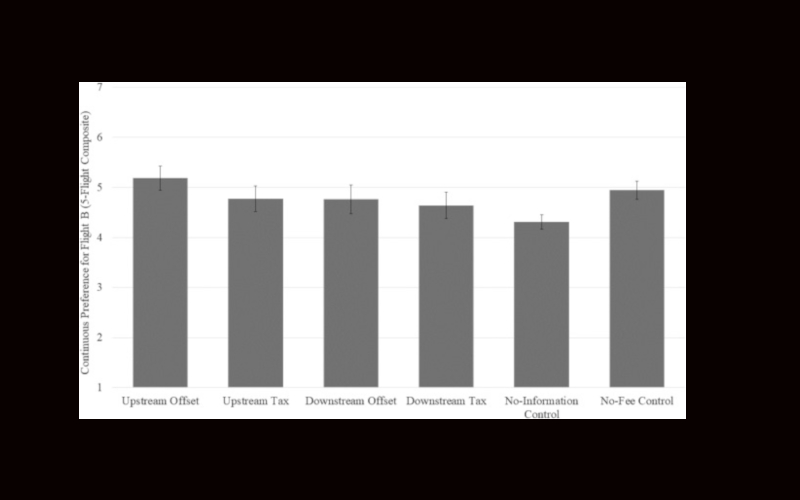
News
UBC study on palatable carbon pricing for air travellers
October 7, 2019 By Wings Staff
 The mean preference for flights carrying a $14.00 carbon fee within each condition in Study 1. Error bars indicate 95% confidence intervals. (Chart: Journal of Environmental Psychology)
The mean preference for flights carrying a $14.00 carbon fee within each condition in Study 1. Error bars indicate 95% confidence intervals. (Chart: Journal of Environmental Psychology) A new study from the Sauder School of Business at the University of British Columbia finds that air travellers are willing to pay a little more for flights if they know the extra money will be used to address carbon emissions. The study looks at consumer reactions to “upstream” versus “downstream” carbon pricing; how “upstream offsets” are uniquely preferred over other pricing methods such as “downstream taxes”; and perceived environmental impact and accountability by consumers.
How fees are presented at the time of ticket purchase is the key to consumer acceptance, according to the UBC study, which notes people respond better when the fee is labeled as a carbon offset rather than a tax. The study also notes people respond better if they know the producers and importers of airplane fuel have been billed for it — not just themselves.
“People have the perception that the oil companies are the ones responsible for climate change, or at least more responsible than they are,” said study co-author David Hardisty, an assistant professor of marketing and behavioural science at the UBC Sauder School of Business. “Consumers are more supportive of carbon pricing if it’s directed at the fossil fuel producers and importers than if it’s directed at consumers.”
The findings from the UBC study were recently published in the Journal of Environmental Psychology. Its authors note it suggests a path forward for the global airline industry as a significant and growing source of carbon emissions. In the absence of policy changes, the authors explain emissions from air travel are on track to triple over the coming decades, which can be mitigated by carbon offsets – fees paid by polluters which are then redirected toward projects that reduce emissions elsewhere in the world.
The study’s authors wanted to find out if the airline industry’s negative impact on the environment could be partly addressed by routinely packaging carbon offsets along with the cost of tickets.
The study, conducted in partnership with the Environmental Defense Fund, consisted of two separate online surveys of more than 1,800 U.S. participants. “We wanted to gauge consumers’ reaction to a $14 carbon fee that was presented to them in several different ways at the time of a hypothetical ticket purchase,” said study co-author Alec Beall, a postdoctoral researcher in UBC’s psychology department. “The dollar amount of the charge was the same, but it was described as either a ‘carbon offset’ or a ‘tax,’ for either ‘aviation fuel production and import’ or ‘airplane travel.’”
The study found that words mattered as consumers were consistently more likely to choose a flight that included a carbon price when it was described as a “carbon offset for aviation fuel production and import” instead of a “carbon tax for airplane travel.” The authors explain that consumers even chose more expensive tickets with a fee described this way over cheaper tickets that had no extra $14 fee attached at all.
“Taxes feel like you’re charging people money for nothing,” said Hardisty. “Whereas an offset is the idea that, ‘Sure we’re paying, but we kind of have an idea where that payment is going, to make the environment better,’ which is what people want.”
Read more about the study at the Journal of Environmental Psychology.